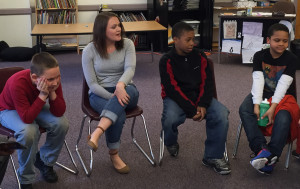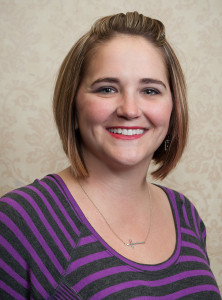
The children at Buxmont Academy Elementary at Pottstown, in Pennsylvania, are working hard to overcome an array of learning and life difficulties.
“The children come to us with a range of challenges,” explains Erin Keller, the school’s coordinator, who earned her master's degree at the IIRP in 2015. Social and emotional learning is crucial to enable the students — in grades one through six — to move forward.
Thinking about the impact their actions have on others is an important new skill. The students’ first tendency is to blame someone else. But Erin and her staff emphasize that the children are in control of their own behavior. “That’s the biggest change we see,” maintains Erin. “Kids begin to understand: That happened because I made that choice.”
When a boy brought a knife to school, instead of punishing him or telling him he’d done something bad, Erin asked him to think and talk about the effect this had on everyone in the school. He then understood why it wasn’t a good idea, and he never did it again.
“At first, students think, ‘I’m here because I’m bad,’” Erin observes. Staff helps them understand that they’re not bad, but maybe they’ve made some bad choices. The children come to believe that the choices they’ve made don’t define them. “They look back at where they were and realize, ‘I can think about my choices and turn my life around.’”
 Erin Keller, coordinator of Buxmont Academy Elementary at Pottstown Students participate in frequent one-on-one and group sessions to discuss their feelings about what’s going on at school and at home. Talking about feelings is a learning process, too. The younger children, in particular, need to learn how to identify their feelings, beyond just happy, mad and sad. The students also gain coping and calming skills. Instead of acting out or behaving aggressively, they learn to “take five,” reflect, draw or write about their feelings.
Erin Keller, coordinator of Buxmont Academy Elementary at Pottstown Students participate in frequent one-on-one and group sessions to discuss their feelings about what’s going on at school and at home. Talking about feelings is a learning process, too. The younger children, in particular, need to learn how to identify their feelings, beyond just happy, mad and sad. The students also gain coping and calming skills. Instead of acting out or behaving aggressively, they learn to “take five,” reflect, draw or write about their feelings.
As in all IIRP model programs, the children at Buxmont Elementary become an active part of their school’s supportive community. “Veteran” students are eager to help other children with their issues if they see that they’re struggling.
When a new student was being loud and disruptive, veteran student “J” became very upset. Another veteran, “T”, took “J” aside and calmed her down. Then all three students sat down and resolved their issue together.
Everyone works together to build positive relationships and behavior.
Erin tells about one fifth grader who made a big change: “He was a very hurt little boy; he used profanity all the time and was angry and violent.” Now if something bothers him, he has the skills to calm down and cope, and he loves helping other children who are having problems. Transformations like this are the reason that Erin Keller loves coming to work every day.
